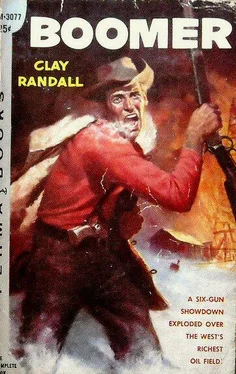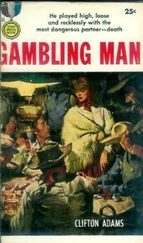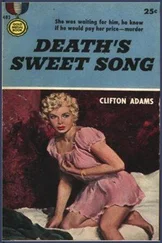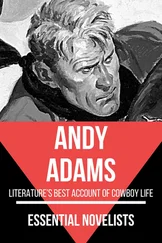Clifton Adams - Boomer
Здесь есть возможность читать онлайн «Clifton Adams - Boomer» весь текст электронной книги совершенно бесплатно (целиком полную версию без сокращений). В некоторых случаях можно слушать аудио, скачать через торрент в формате fb2 и присутствует краткое содержание. Жанр: Старинная литература, на английском языке. Описание произведения, (предисловие) а так же отзывы посетителей доступны на портале библиотеки ЛибКат.
- Название:Boomer
- Автор:
- Жанр:
- Год:неизвестен
- ISBN:нет данных
- Рейтинг книги:5 / 5. Голосов: 1
-
Избранное:Добавить в избранное
- Отзывы:
-
Ваша оценка:
- 100
- 1
- 2
- 3
- 4
- 5
Boomer: краткое содержание, описание и аннотация
Предлагаем к чтению аннотацию, описание, краткое содержание или предисловие (зависит от того, что написал сам автор книги «Boomer»). Если вы не нашли необходимую информацию о книге — напишите в комментариях, мы постараемся отыскать её.
Boomer — читать онлайн бесплатно полную книгу (весь текст) целиком
Ниже представлен текст книги, разбитый по страницам. Система сохранения места последней прочитанной страницы, позволяет с удобством читать онлайн бесплатно книгу «Boomer», без необходимости каждый раз заново искать на чём Вы остановились. Поставьте закладку, и сможете в любой момент перейти на страницу, на которой закончили чтение.
Интервал:
Закладка:
He beat his arms together, hunching into the bitter wind that swept down through the canyon of naked cottonwoods, realizing that he had to trust Valois. He could not fight Dagget's wrath alone.
With cool deliberateness, he rode the gelding on past the dugout and dismounted a hundred yards upstream. Here the ground was frozen hard as flint, carpeted with brown, brittle bunch grass, making a trail almost impossible to follow. With numb fingers he unbitted and threw loose the cinch, stripping his meager gear from the gelding's back. Without a moment's hesitation he cracked the black across the rump and stood for a moment watching the startled animal bolt upstream for perhaps fifty yards then turn slowly and start walking back toward Sabo.
The decision was made, and there was no backing out. The rest was up to Turk Valois.
Bleakly, he took up his saddle and roll and made his way back downstream to a log crossing. Carefully parting the curtain of weeds, he paused in front of the stockade door sagging obliquely on one leather hinge, and a kind of bitter humor welled up inside him as he thought of his hard-scrabble farm in Missouri. So much had happened that he hadn't had time to think back or feel regret. But he had plenty of time now, he thought wryly—it was all he did have.
He shoved the door inward and it ripped from its rotten hinge and went crashing to the ground. Gently he eased his rig to the ground and stepped into the cavelike darkness of the dugout. Once this place had meant hope to someone, maybe to some awkward cowhand like himself who had held visions of owning his own land, being his own boss, in some vague way hoping to make something of himself.
But from the looks of things, the man who built this dugout had come on bad luck, too. Likely the cavalry had routed him out of here, as they had so many of Captain David L. Payne's misguided Boomers.
Grant searched his windbreaker for a match and held the flaming sulphur above his head as he surveyed the place. A lot of work had gone into the building, a lot of useless work. First the clay creek bank had been dug out, and then Cottonwood logs had been cut and split to side the dirt walls of the cabin. A crude sod fireplace stood against one wall, and a chimney fashioned of sticks and mud had once reached up through the top of the dugout. And perhaps there had been furniture here once, homemade or hauled in by wagon, but the floor was bare now. Only the fireplace remained; the mud chimney had long since crumbled and disappeared. And dirt sifted down like sporadic rain between the huge log beams of the ceiling, and before long it would fall in completely and fill up with more dirt and no one would ever guess that a man—a family perhaps—had lived here once.
Grant dropped the match and let the flame go out. There was too much here that reminded him of himself and he didn't want to see any more of it.
In the failing fight from the outside he opened his roll and spread his blanket in the corner of the room; then he propped the door in place, blocking out the cutting wind, and a sheet of blackness came down on the only available light.
I'll wait, he thought. That's all I have to do. Valois helped me once—twice—and he'll do it again.
And he felt his way to the corner and sat on the thin blanket, cursing himself for not thinking to bring provisions. But there hadn't been time to think of provisions. There had been time to run and that was all.
He didn't want to think, but there was little else to do in the tomblike darkness of the dugout. He drew his revolver from his waistband and busied himself with cleaning it, but that wasn't enough to stop the aimless procession of thoughts that passed through his mind.
It was too late for regrets. He should have thought of that before robbing the bank in Joplin. Too late for anything now except to wait, and run when he got the chance. And he smiled grimly, rubbing hard along the barrel of his .45. Who would have thought that it would have ended like this?
It was early morning when he awoke with the steel-hard light of winter slanting through the cracks of the propped-up door. There was a new smell to the air, a sharpness that had not been there the night before. He threw off the thin blanket and got to his feet numbly, knowing what he would see even before he pulled the door inward.
A long shelf of slaty, stonelike clouds had slipped in from the north during the night, and a gun-steel case was on the sky. The wind had settled and an uneasy hush lay over the prairie, and a prickle of warning started at Grant's neck and worked its way up to his scalp. There was snow and sleet in those clouds, and the kind of wind that only the plains country knew. He stepped outside into the funeral-like silence, a silence so heavy that the nervous stirring of prairie chickens startled him.
Then, from a distance, he heard the sound of hoofs, and his heart pounded a little faster in the hope that it might be Valois. But when he climbed the creek bank and lay belly down in the tall weeds, he saw two Creeks driving a small bunch of cattle to the south, ahead of the storm. When they over on his back and studied the sky thoughtfully. Already, in the east, the slablike clouds were shredded with sleet and snow, and the horizon shimmered behind a gauzy curtain of ice.
In a way the snow was good—it would cover any tracks that he might have left. At the same time it might hold up Valois. And—despite his resolutions—he found himself thinking of Rhea again. There was no telling how long a norther would last—it might hold up construction of the well for days. And there, he thought grimly, would go Rhea's dream, wiped out in a storm of snow and ice, and Ben Farley would have his way, after all.
He lay there for a long time, feeling strangely empty. And the loneliness at that moment was heavier than anything he had ever known before.
Almost too late did he hear the approach of more horses-several of them this time, coming from the north. Grant lay motionless in the rattling stand of mullein as the six horsemen broke out of a thicket at the far end of the creek and rode a plodding crow line cross-country toward Sabo. Grant heard his compressed breath whistle between his teeth when he recognized the lead rider as Jim Dagget.
Evidently the marshal hadn't wasted time trying to trail Grant from the lease but had picked up a posse and headed for the border to cut him off. Evidence of failure was etched like saber cuts at the corners of Dagget's hard mouth. The other riders glanced warily over their shoulders at the gathering storm, or slumped heavily in their saddles, sodden with fatigue and cold. Only the marshal rode stiffly erect, his restless, flashing eyes gouging at every bush and thicket.
Instinctively Grant pressed harder to the frozen ground as the marshal reined up a scant hundred yards away, and one of the riders said, “You see somethin', Marshal?”
“No. But it would be better if we spread out on either side of the creek and follow the stream back to Sabo.”
The rider grunted uneasily. “That norther's goin' to hit any minute now. Don't you think we'd better stick together?”
“Any fool can find his way home by following the creek, even in a snowstorm,” Dagget said. He tossed his head like an angry mountain lion and sniffed the air. “Grant's out there somewhere, probably between here and Sabo.”
“If he is, the storm will get him.”
“I don't want the storm to get him!” Dagget turned in the saddle and raked the riders with his anger. “That's a job I set for myself!”
The horses tramped nervously, betraying the emotions of their riders. “Well,” one of the horsemen said at last, not returning the marshal's gaze, “I guess we can spread out until the storm hits.”
The voices carried like bullets on the still air, and Grant could see the puffs of frost as the men talked; he could almost smell the warm animal odor of the steaming horses. As the riders quartered toward the creek, below the dugout, Grant let out the breath that he had been holding. This was too close for comfort. The sooner he got out of the Territory the better he would like it, storm or no storm. For he had glimpsed the marshal's rage, he had felt Dagget's iron-hard determination on the morning air. Dagget was a bulldog. He would never turn loose.
Читать дальшеИнтервал:
Закладка:
Похожие книги на «Boomer»
Представляем Вашему вниманию похожие книги на «Boomer» списком для выбора. Мы отобрали схожую по названию и смыслу литературу в надежде предоставить читателям больше вариантов отыскать новые, интересные, ещё непрочитанные произведения.
Обсуждение, отзывы о книге «Boomer» и просто собственные мнения читателей. Оставьте ваши комментарии, напишите, что Вы думаете о произведении, его смысле или главных героях. Укажите что конкретно понравилось, а что нет, и почему Вы так считаете.












